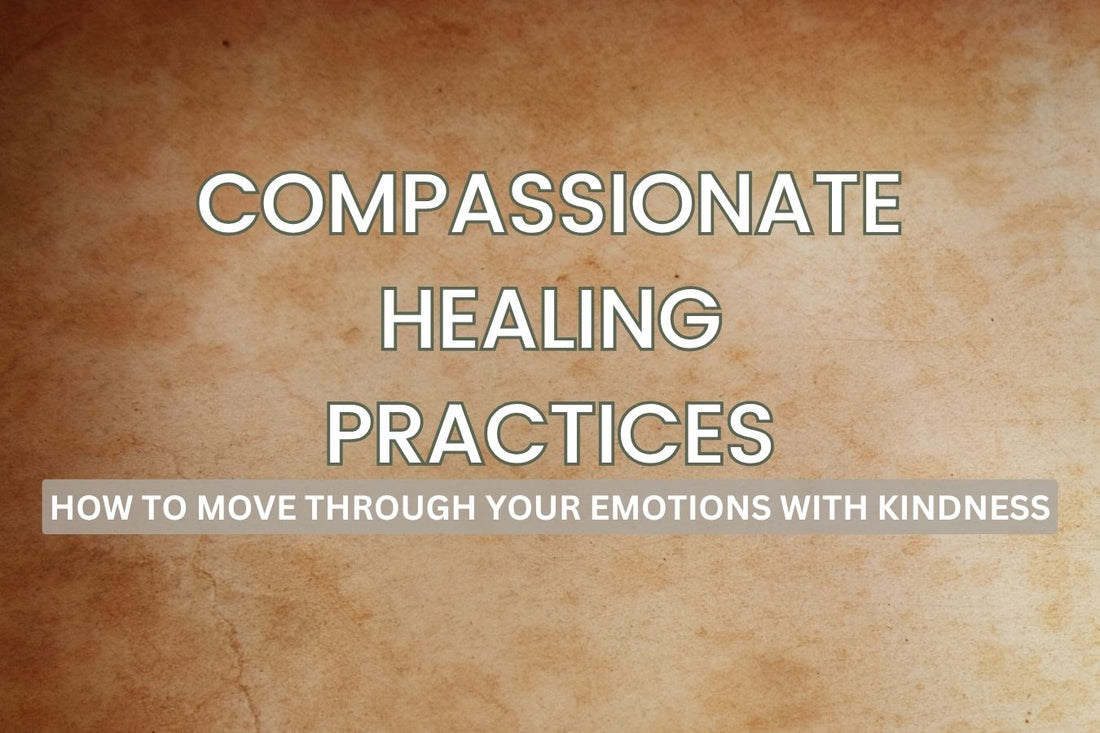
Compassionate Healing Practices: How to Move Through Your Emotions with Kindness
Share
Embarking on a healing journey often means unpacking layers of emotions and experiences that have been stored away for years. This process can feel overwhelming, but approaching it with self-compassion transforms it into a gentle, nurturing experience. By cultivating kindness toward yourself, you create a safe space to explore your emotions, release old patterns, and reconnect with your authentic self.
In this blog, we’ll explore what self-compassion really means, how it supports your healing journey, and practical ways to integrate it into your daily life. Plus, you’ll find reflective questions to help you navigate your emotional layers with care and understanding.
Understanding Self-Compassion on the Healing Journey
Defining Self-Compassion: At its core, self-compassion is treating yourself with the same kindness and understanding you would offer a close friend during difficult moments. It’s about offering care, patience, and support to yourself, especially when life feels heavy.
Compassion in Unpacking: Unpacking emotional baggage can feel daunting. Self-compassion acts like a gentle current, helping you navigate these waters without judgment, fear, or overwhelm.
What Self-Compassion Looks Like in Practice
-
Acknowledging Pain Without Judgment: Recognize your emotions without labeling them as “good” or “bad.” Your feelings are valid, and self-compassion helps you honor them.
-
Offering Comfort in Vulnerability: When you feel distressed, offer yourself soothing words, small acts of care, or quiet reflection. Let yourself feel seen and supported.
-
Embracing Imperfection: Healing isn’t linear. Self-compassion reminds you that growth comes with setbacks, and every small step forward matters.
Simple Ways to Cultivate Self-Compassion
-
Mindful Awareness: Notice your thoughts and emotions without judgment. Mindfulness helps you respond with understanding rather than reactive habits.
-
Positive Affirmations: Replace self-criticism with affirming, supportive statements. Over time, this rewires your inner dialogue to foster kindness.
-
Self-Care Rituals: Prioritize activities that nourish your mind, body, and soul—a warm bath, nature walks, journaling, or quiet reflection.
-
Healthy Boundaries: Learn to say no and protect your energy. Compassion includes respecting your own limits.
-
Seeking Support: Share your journey with trusted friends, family, or professionals. Connection brings additional compassion and perspective.
Navigating the Weight of Emotional Unpacking
-
Facing Fear With Kindness: Uncovering suppressed feelings can be scary. Self-compassion acts as a supportive guide, helping you meet fear with gentleness.
-
Honoring Your Pace: Healing happens at your speed. Be patient with yourself and resist rushing through emotional layers.
-
Creating a Safe Inner Sanctuary: Build an internal space where you can unpack freely. Self-compassion turns this space into a haven for vulnerability and authenticity.
Reflective Questions to Nurture Self-Compassion
-
How do I usually respond to my pain or challenges, and how can I introduce more kindness into these moments?
-
What self-compassionate affirmations resonate with me, and how can I make them part of my routine?
-
In moments of vulnerability, which self-care practices bring comfort and nourishment?
-
Where in my life can I establish healthier boundaries to prioritize well-being?
-
What fears arise when I think about unpacking certain emotional layers, and how can I approach them with compassion?
-
How can I honor the imperfect pace of my healing journey?
-
What would a personal inner sanctuary look like, and how can I cultivate it?
-
When seeking support, what qualities in others make me feel understood and supported?
-
How can mindfulness deepen my self-compassion practice?
-
What small victories of self-compassion can I celebrate each day?
Gently Moving Forward With Compassion
Unpacking your emotions takes courage, but self-compassion makes the journey lighter, gentler, and more sustainable. By acknowledging your pain, embracing vulnerability, and caring for yourself daily, you create a healing space where growth and transformation are possible.
Getting curious about your emotional patterns is powerful but having gentle tools to guide you can make the process even richer. Journaling prompts, like those in the Radiance Shadow Work Journal, help uncover hidden patterns and release blocks. Pairing this with intentional affirmations, like a Confidence Candle, creates simple daily rituals that reinforce your inner strength and personal power.
